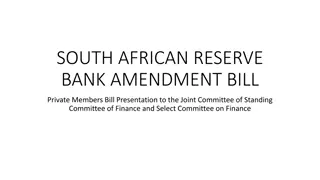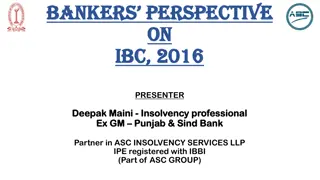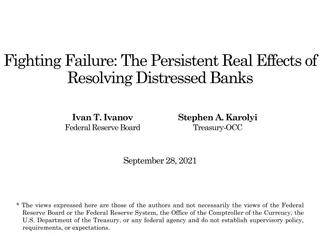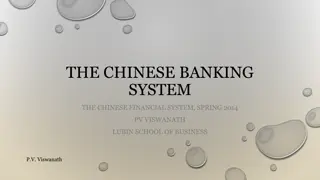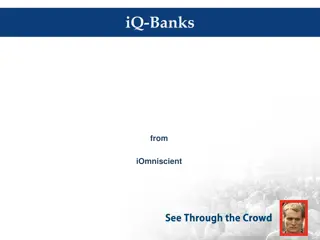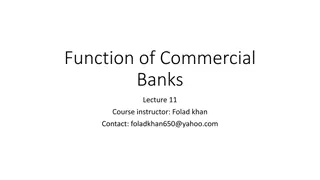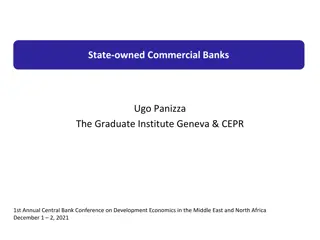Role of Central Banks in International Financial Institutions
Central banks play a crucial role in the interconnectivity with international financial institutions like the Asian Development Bank (ADB) and the International Monetary Fund (IMF). These institutions aim to promote economic and social development, ensure exchange rate stability, provide financial a
1 views • 18 slides
Challenges and Future Prospects for Cypriot Banks
The presentation delves into the global challenges faced by Cypriot banks, including the economic impacts of the pandemic and the Russian invasion of Ukraine. It highlights advancements in anti-money laundering efforts, the adoption of ESG standards by Cypriot banks, and the importance of addressing
0 views • 34 slides
Understanding the Functions of Commercial Banks
Commercial banks play a vital role in the financial system by accepting deposits and providing loans to individuals, businesses, and companies. They offer various types of accounts such as current, saving, and fixed deposit, each with its unique features. Additionally, commercial banks make loans in
4 views • 10 slides
CBI- Central Bank of India apprentice recruitment process.
Central Bank of India (CBI) holds the distinction of being among the most established and sizable commercial banks in India. It was established in 1911. It has a significant presence in the Indian banking sector. \nTo Know more: \/\/obcrights.org\/blog\/jobs\/government-jobs\/central\/exams\/banking
9 views • 5 slides
Understanding Banks and Mobile Banks in Financial Services
The concept of banks originates from the word "banco," meaning bench, which evolved to refer to a financial institution. Banks gather funds from the public as deposits and distribute them as credits to enhance people's living standards. Additionally, mobile banks, unlike traditional banks, provide l
7 views • 11 slides
Unforgettable African Safari Holiday Adventures
Interior Safaris East Africa crafts exclusive African safari holidays for avid travelers. They allow you to explore the best of wildlife in Uganda, Ruanda & Tanzania! They will make your experience in East Africa like a local, making your African safari holidays different altogether. You can combine
2 views • 5 slides
Overview of Banking Institutions and Types
Banking institutions play a crucial role in the economy by accepting deposits from the public and providing financial services. They are classified into various types such as commercial banks, investment banks, cooperative banks, and central banks. Commercial banks cater to the working capital needs
1 views • 13 slides
Functions of Commercial Banks Explained
Commercial banks provide a range of services beyond their primary functions, acting as agents for customers in collection and payment of credit, purchase and sale of securities, trustee and executor roles, remittance of money, and representation and correspondence. Additionally, they offer general u
0 views • 7 slides
Understanding the Banking Sector Fundamentals
Banks play a vital role in the economy by accepting deposits and providing loans, aiding in capital formation and accumulation. The word "bank" originates from the French term for a bench. The Banking Regulation Act of 1949 defines banking activities. Banks deal with money deposits, credit, and comm
0 views • 20 slides
Understanding the Importance of Seed Banks in Ecosystems
Seed banks, categorized into soil and aerial types, serve as essential reservoirs for viable seeds and propagules. Soil seed banks are natural storage areas for seeds within ecosystems and play a crucial role in plant regeneration. They can persist for varying durations, influencing plant diversity
1 views • 16 slides
Understanding Different Types of Banks in India
Explore the various types of banks in India, including Scheduled Banks, Non-Scheduled Banks, Commercial Banks, and Cooperative Banks. Learn about their classifications, regulations, and primary functions as detailed by experts in the field. Discover the significance of banking operations as governed
0 views • 18 slides
Understanding Central and Non-Central Forces in Physics
Newton's laws of motion introduced the concept of forces, leading to the classification of fundamental forces like gravitational, electromagnetic, strong nuclear, and weak nuclear forces. Central forces act toward or away from a fixed center, while non-central forces are affected by additional param
0 views • 7 slides
Overview of Development Banks and Their Functions
Development banks, including national and foreign entities, play a crucial role in promoting economic, social, and environmental development by financing projects that may not receive adequate private funding. These banks are typically government-owned but may have mixed or private ownership. They a
0 views • 37 slides
Presentation of South African Reserve Bank Amendment Bill to Joint Committee
The Economic Freedom Fighters (EFF) presented the South African Reserve Bank Amendment Bill to amend the current ownership structure allowing private individuals, including foreigners, to own shares in the South African Reserve Bank. The presentation emphasizes the need for legislative actions withi
0 views • 19 slides
Challenges Faced by Banks in Adopting IBC
Banks face challenges in adopting the Insolvency and Bankruptcy Code (IBC) due to stringent provisioning norms, additional costs, and complexities in referring cases to the National Company Law Tribunal (NCLT). Secured NPA accounts older than 2 years, unsecured NPA accounts in the second year, and c
0 views • 20 slides
Role of Central Banks in Economic Development: Insights from Zahid Husain Memorial Lecture
The Zahid Husain Memorial Lecture in Karachi, Pakistan, explored the pivotal role of central banks in national economic development. Topics such as the effective state model, capacity to tax, checks and balances on power abuse, and challenges in economic behavior theory were discussed. Understanding
1 views • 12 slides
Role of Securities Firms and Investment Banks in Financial Markets
Securities firms and investment banks play a vital role in facilitating the transfer of funds between suppliers and users in financial markets with efficiency and low costs. Investment banks assist businesses and governments in raising funds through securities issuance, while securities firms aid in
0 views • 26 slides
Challenges in Developing Indigenous African Psychology
The lack of development of indigenous African psychology can be attributed to various factors such as the dominance of Western-oriented frameworks in research, Eurocentric nature of mainstream psychology, lack of awareness among African people about psychology, and exclusion of indigenous African kn
2 views • 64 slides
Functions of Commercial Banks
Primary functions of commercial banks include acceptance of deposits such as fixed deposit, current deposit, saving deposit, and recurring deposit. Banks also advance loans for productive purposes, including call money, overdraft, cash credit, and discounting of bills. Another crucial function is cr
0 views • 6 slides
Mitigation and Conservation Banks: A Comprehensive Overview
This content presents insights from Wayne White, President of the National Mitigation Banking Association, regarding the concept of mitigation/conservation banks, their evolution, benefits, agency requirements, and the principles behind their establishment. It emphasizes the importance of market-dri
0 views • 28 slides
Banking Ethics and Cultural Evolution in Financial Institutions
Commercial banks face ethical challenges, with smaller banks generally maintaining higher ethical standards. The ethical practices of banks include good customer service, transparency, and sustainable lending. Banks have a dual nature of profit-making and ethical obligations. The marketization of so
0 views • 21 slides
Understanding the Real Effects of Resolving Distressed Banks
This study delves into the lasting impact of resolving distressed banks on the economy, showcasing significant compliance with regulatory thresholds and persistent adverse effects on local economies post-resolution. Findings suggest a notable drop in employment and establishments, with effects inten
0 views • 18 slides
Understanding Banking Institutions and Their Types
Banking institutions play a vital role in the financial sector by mobilizing public savings and providing funds to meet various financial needs. Commercial banks, investment banks, co-operative banks, and central banks are some examples of banking institutions. Scheduled banks enjoy certain benefits
0 views • 17 slides
Role and Functions of Commercial Banks in the Financial Sector
Commercial banks are profit-seeking financial institutions that accept deposits from the public and provide loans for investment purposes. They specialize in financing trade and commerce through short-term loans, utilizing the interest rate difference between borrowers and depositors as a primary in
0 views • 6 slides
African Traditional Religions: Beliefs, Gods, and Rituals
African traditional religions encompass a diverse range of belief systems and practices among native Africans. These religions often involve polytheistic beliefs with a central High God. Various gods, goddesses, spirits, and ancestors are revered, and rituals play a significant role in these faith t
0 views • 41 slides
Evolution of the Chinese Banking System: A Historical Overview
The evolution of the Chinese banking system from a mono-bank to a tripartite system comprising central, development, and commercial banks is explored. The transition to market-based banking, equitization of state-owned banks, and the role of regulatory bodies in managing bad loans are discussed. The
0 views • 25 slides
iQ-Banks Security and Operations Solutions Overview
iQ-Banks offers a range of advanced solutions for ATM security, branch operations, face recognition, and mobile agent communication. These solutions include features such as detecting theft, vandalism, skimming devices, and intrusions, as well as providing access control, license plate recognition,
0 views • 6 slides
Overview of Commercial Banks in the Financial Industry
Commercial banks play a crucial role in the financial industry by accepting customer deposits, providing loans, and facilitating the transmission of monetary policy. They differ from nonfinancial firms in their balance sheets, with assets mainly composed of loans and other financial assets. Regulate
0 views • 23 slides
Understanding the Role of Commercial Banks in Financial Systems
Commercial banks play a vital role in the financial system by accepting deposits and providing loans to individuals, firms, and companies. They offer various types of accounts like current, savings, and fixed deposit accounts, each with specific features. In addition, commercial banks make loans to
0 views • 10 slides
Analysis of State-owned Commercial Banks Ownership Patterns
Data analysis of ownership histories for over 27,000 commercial banks in 184 countries from 1995-2018, focusing on state-owned banks. The study reviews state ownership trends, correlations with bank performance, industry-level evidence, and lending to governments. The research also delves into perfo
0 views • 28 slides
Update on Direct Cash Settlement Implementation in Nigerian Capital Market
The update on Direct Cash Settlement (DCS) in the Nigerian Capital Market as of November 2016, by Ade Bajomo, covers progress on DCS account set-up requests to settlement banks, BVN validation by brokers, analysis of rejected DCS account set-up requests, major challenges faced, and recommendations f
0 views • 10 slides
The Polish Banking Sector 2013/2014 Overview
The data provides insights into the Polish banking sector for the years 2013 and 2014, including information on the number of banks, ownership structure, assets, profits, and the percentage of assets belonging to loss-bearing banks compared to other EU countries. There is a visible trend of increasi
0 views • 17 slides
Agricultural Finance and Banking System Overview
Agricultural finance encompasses various services to support farm activities, with sources including institutional and non-institutional channels. In India, agricultural credit is available from sources like moneylenders, co-operatives, and commercial banks. Commercial banks play a crucial role in p
0 views • 12 slides
Understanding the Evolution of Danish Banks: Past, Present, and Future
Explore the fascinating journey of Danish banks through the past, present, and future at the FRIC Practitioner Seminar. Delve into topics such as insolvency regulation, bank resolution, investor roles, and the concentration of financial institutions in Denmark. Gain valuable insights into the essent
0 views • 30 slides
Evolution of Banking Institutions: History, Practices, and Regulations
Delve into the evolution of banking institutions from money changers to modern commercial and investment banks. Explore the historical context, current practices, and regulatory frameworks governing banking activities at both the EU level and within individual Member States. Discover the distinction
0 views • 14 slides
Risk Management Challenges in African Central Banks
African central banks face challenges in risk management, particularly in trade banks default payments, credit risks, and handling electronic money. The banking sector in Africa shows weaknesses in lending to small and medium enterprises and lacks a strong capital market infrastructure, impacting th
0 views • 20 slides
Functions of Commercial Banks
Commercial banks serve the main function of accepting deposits and providing loans to maximize profits. The primary functions include accepting deposits and advancing loans and investments. Deposits come in various types such as current, savings, term/time, and recurring deposits. Loans provided inc
0 views • 14 slides
Strategies for Resolving Non-Performing Loans in African Central Banks
Central Bank of Nigeria's Banking Supervision Department addresses the evolution, causes, and strategies for managing non-performing loans (NPLs) in the Nigerian banking sector to ensure financial stability. The Central Bank regularly monitors NPL ratios and implements reforms to prevent bank failur
0 views • 14 slides
Overview of the African Human Rights System
The African Human Rights System encompasses various key elements such as the Organisation of African Unity, African Charter on Human and Peoples' Rights, African Court on Human and Peoples' Rights, African Union, and additional human rights-related treaties and protocols. This system aims to protect
0 views • 19 slides
Evolution from the Organisation of African Unity (OAU) to the African Union: A Journey Towards Pan-African Unity and Development
The transition from the OAU to the AU marked a significant shift in African politics, focusing on unity, solidarity, and cooperation among member states. The AU aims to promote development, eradicate poverty, defend sovereignty, and incorporate Africa into the global economy. With a strong emphasis
0 views • 10 slides













